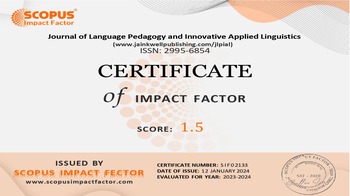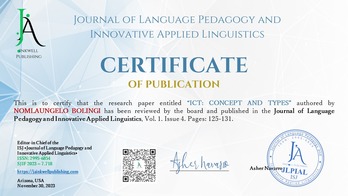Why Do We Study
DOI:
https://doi.org/10.1997/2qdz8m77Keywords:
vitality of education, advantages of education, importance of education in society, communication and opinion sharing with individuals from different nationsAbstract
This abstract explores the importance of education in modern society and how it contributes to bridging borders, creating equal opportunities, and introducing empowerment. Moreover, Education is an essential part of a society's growth and progress, enabling people to contribute to their families and society in multiple fields. This essay outlines five reasons why education is important to society: creating employment opportunities, securing a higher income, developing problem-solving skills, improving the economy, and providing a prosperous and happy life. Education empowers individuals to obtain qualifications, skills, knowledge, and experience to stand out from a pool of applicants, increase their chances of securing a fulfilling job, and make sound decisions on various quandaries.
Downloads
References
Обруева, Г. Х. (2010). О сдвиге имени собственного в разряд нарицательных слов во фразеологии английского языка. Вестник Челябинского государственного университета, (22), 100-102.
Early childhood education in English for speakers of other languages by ViAdam, Bob and Morris Paul (1997) the English curriculum in the People's Republic of China, comparative education Review,41,3–26 Alcon, E and Guzman, J-R (2000).
Begmatov, M. (2021). Infinitive Verbs and Their Grammar Functions in German Language. European journal of innovation in nonformal education, 1(2), 51-53.
Begmatov, M. (2019). About speech word in modern German. In 9th International Conference" Science and practice: a new level of integration in the modern world", Scope Academic House (pp. 32-35).
Begmatov, M. B. (2020). Features of the Organization of an Integrated Introductory Phonetic Course of German as a Second Foreign Language in a Non-Linguistic Higher Educational Institutions. Theoretical & Applied Science, (7), 265-268.
Каримова, Л., & Бегматов, М. (2022). Ҳозирги немис тилида иловали элементларнинг структур ўзига хосликлари. Современные лингвистические исследования: зарубежный опыт, перспективные исследования и инновационные методы преподавания языков, (1), 61-62.
Бегматов, М. (2022). Иловали конструкцияда тема ва рема муносабатларининг ифодаланиши. Современные лингвистические исследования: зарубежный опыт, перспективные исследования и инновационные методы преподавания языков, (1), 8-9.
Саидов, З., & Бегматов, М. (2022). Иловали элементларнинг асосий ифодага боғланиш усуллари ҳақида. Современные лингвистические исследования: зарубежный опыт, перспективные исследования и инновационные методы преподавания языков, (1), 25-26.
Саидов, З., & Бегматов, М. (2022). Илова конструкциянинг ўзига хос хусусиятларини ўрганишга доир. Ta'lim va rivojlanish tahlili onlayn ilmiy jurnali, 61-63.
Mukhtor, B. (2022). Using innovative and pedagogical technologies in German language classrooms. Academicia: An International Multidisciplinary Research Journal, 12(11), 35-39.
Mukhtor, B. (2021). The formation of derivative words from the bases of borrowed lexical units in the German language of the modern period. ACADEMICIA: An International Multidisciplinary Research Journal, 11(10), 1377-1385.
Примов, Б., & Бегматов, М. (2016). Аспектологические исследования в Узбекистане. Иностранная филология: язык, литература, образование, (3 (60)), 93-97.
Бегматов, М. (2016). Особенности явления эллипсис в немецком языке. Иностранная филология: язык, литература, образование, 1(2 (59)), 76-80.
Downloads
Published
Issue
Section
License
Copyright (c) 2023 Asilbek Elmurzayev, Azizbek Ismoilov, Zaynab Shermamatova (Author)

This work is licensed under a Creative Commons Attribution 4.0 International License.












